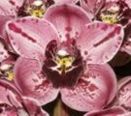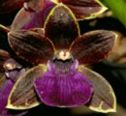 |
 |
 |
Virus Policy Revised: 10/24/2008 |
Virus Policy
Our Virus Prevention and Detection Methods
Virus prevention and detection is a significant effort at our nursery. We go to great lengths to ensure the plants we grow are free of virus, and have a stringent testing program in place for the two most common orchid virus types, Odontoglossum Ringspot Virus (ORSV) or Cymbidium Mosaic Virus (CymMV).
Virus infection of cymbidiums by either CymMV or ORSV will usually show up as a sharp edged lighter green mottling of the leaf or white or red streaking in the emerging new growth. We are constantly on the lookout for any plant that exhibits such symptoms in the nursery. Any plant that looks the least bit suspicious is summarily thrown in the trash. If all plants would show these symptoms, control of virus would be relatively simple. Not all do, so this is only one step of several in maintaining a virus free collection.
Maintaining virus free propagation stock, both as parent plants and those selected for cloning, is the basis for maintaining a virus free collection. To that end, we test and quarantine for several months every plant coming into the nursery as potential parent stock. Every plant that provides pollen for a hybrid is tested before the pollen is used to pollinate a flower. Every plant carrying a green seed pod is tested before the pod is harvested and sown by the green pod technique. Seed transmission of virus by removing seed from the sterilized green pod likely if the plant is virus infected, so the seed from any infected plant is collected dry from the mature, split capsule, and then sterilized to sow in the laboratory. This method of using infected parents to provide clean offspring is considered effective and acceptable for ORSV and CymMv.
Every parent plant to be divided or repotted is tested before it is divided or repotted. All tools used in dividing or repotting plants are sterilized by soaking in a 50% Clorox solution when not in use. Each plant is divided or unpotted on clean newspaper to provide a clean, sterile work surface. A fresh pair of disposable gloves is worn for each plant to prevent transmission of disease from plant to plant, and discarded after each plant. Every plant that has any suspicious marking or look is tested on the spot.
It is possible to transmit virus from one plant to another by any leaves rubbing together. In the nursery, adequate plant spacing is a necessity to minimize contact. When collecting plants to be transported to display in a show, every plant is tested before it is staged for the show. This mimimizes the possibility of virus transmission by leaf contact in transportation.
Every plant to be cloned is tested before the initial growth is taken from the plant, and also during the cloning process, to be certain the cloned material is clean.
The same precautions are taken when potting seedlings. Disposable gloves are used for each flat of plants, all tools are sterilized, and newspaper is used for a clean surface.
With the rigorous processes we use for all our plant production, we believe the plants we offer for sale do not carry either Odontoglossum Ringspot Virus (ORSV) or Cymbidium Mosaic Virus (CymMV). We will replace any plant that tests positive for either of these virus types, either by the Agdia Dual ORSV/CymMV test, or by a commercial virus test laboratory such as Critter Creek, within 60 days of shipping or sale, or refund the purchase and shipping cost of that plant, providing proof of positive test and plant identification is provided to us. We offer to test any plant we sell before shipping using the Agdia dual ORSV/CymMV test for $5.00 to guarantee the plant is clean at time of purchase.